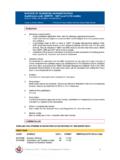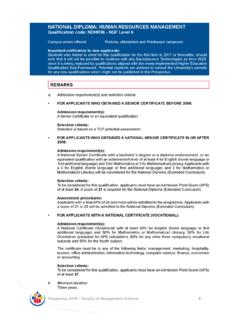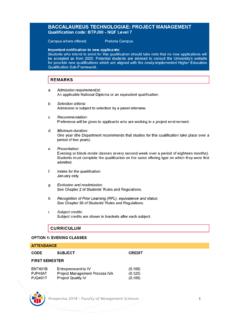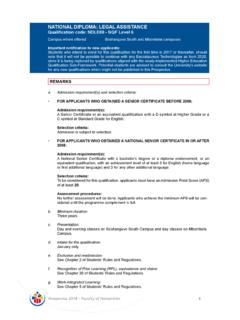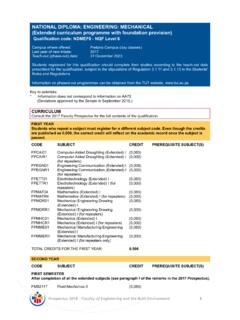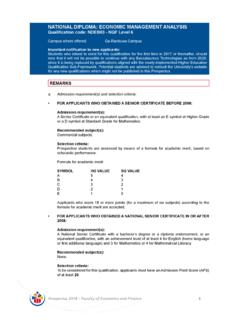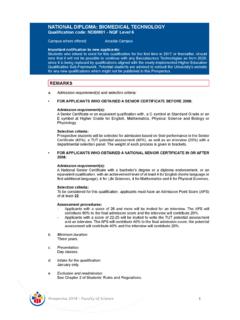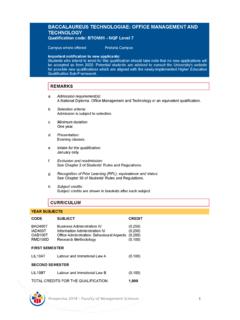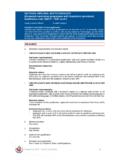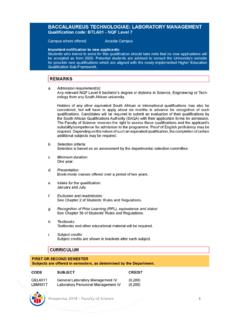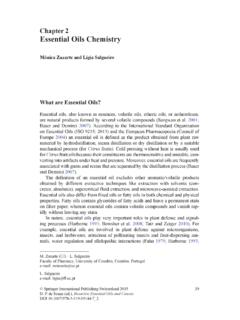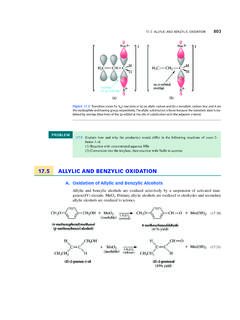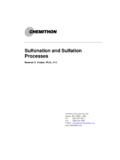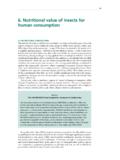Transcription of NATIONAL DIPLOMA: FOOD TECHNOLOGY …
1 1 Prospectus 2018 - Faculty of Science NATIONAL DIPLOMA: FOOD TECHNOLOGY (Extended curriculum programme with foundation provision) qualification code: NDFTF1 - NQF Level 6 Campus where offered: Arcadia CampusImportant notification to new applicants: Students who intend to enrol for this qualification for the first time in 2017 or thereafter, should note that it will not be possible to continue with any Baccalaureus Technologiae as from 2020, since it is being replaced by qualifications aligned with the newly-implemented Higher Education qualification Sub-Framework. Potential students are advised to consult the University's website for any new qualifications which might not be published in this Admission requirement(s) and selection criteria: FOR APPLICANTS WHO OBTAINED A SENIOR CERTIFICATE BEFORE 2008:Admission requirement(s):A Senior Certificate or an equivalent qualification , with an E symbol at Higher Grade or aD symbol at Standard Grade for English, Mathematics and Physical Science.
2 Recommended subject(s) criteria:Applicants who meet the minimum requirements will be invited to do an academic proficiency test. An applicant's performance in the Senior Certificate will contribute 80% to the final admission score and the academic proficiency test, 20%. FOR APPLICANTS WHO OBTAINED A NATIONAL SENIOR CERTIFICATE IN OR AFTER 2008:Admission requirement(s):A NATIONAL Senior Certificate with a bachelor s degree or a diploma endorsement, or an equivalent qualification , with an achievement level of at least 4 for English (home language or first additional language) and 4 for Mathematics, 4 for Physical Sciences and 3 for Life subject(s) criteria:To be considered for this qualification , applicants must have an Admission Point Score (APS) of at least procedures: - Applicants with a score of 24 and more will be considered for admission.
3 - Applicants with a score of 21 to 23 will be invited to do an academic proficiency test. The APS will contribute 80% to the final admission score and the academic proficiency test, 20%.b. Minimum duration:Four Presentation:Day Prospectus 2018 - Faculty of Scienced. Intake for the qualification :January Exclusion and readmission:See Chapter 2 of Students Rules and Recognition of Prior Learning (RPL), equivalence and status:See Chapter 30 of Students' Rules and Recognition:Students who were registered for qualification NDFTF0 and who are still in the process of completing it will be channeled (re-registered) to this programme . Recognition will be granted for all subjects passed. h. Practicals:It is compulsory to attend 100% of the practical classes.
4 Students must pass the practical component of a subject to obtain permission to sit for the Textbooks:Textbooks and other educational material may be Personal protective equipment:Specific safety wear is compulsory where applicable. k. Projects and assignments:Students will be expected to undertake projects and assignments in some of the Work-Integrated Learning I and II:See Chapter 5 of Students Rules and Subject credits:Subject credits are shown in brackets after each subject. Key to asterisks:* Information does not correspond to information in AA72. (Deviations approved by the Senate in May 2012, June 2015 and September 2015.)CURRICULUMSUBJECTS PRINTED IN BOLD ARE NOT FOR REGISTRATION YEAR CODE SUBJECT CREDIT PREREQUISITE SUBJECT(S)FPCLS01 Chemistry IB: Extended* (0,170)FPMLB01 Microbiology I: Extended* (0,236)FPMLS01 Mathematics IB: Extended* (0,140)FPPLS01 Physics IB: Extended* (0,150)FIRST SEMESTERFPENG05 Foundation English (0,087)SECOND SEMESTER FPLSK02 Foundation Life Skills (0,070)TOTAL CREDITS FOR THE FIRST YEAR: 0,8533 Prospectus 2018 - Faculty of ScienceSECOND YEARA fter completion of all first-year SUBJECT CREDIT PREREQUISITE SUBJECT(S)FIRST SEMESTERFPE101T Food Process Engineering IFPE10YT Food Process Engineering.
5 Computer (0,075) Skills I FTN111T Food TECHNOLOGY I (0,150) MBI241T Microbiology II (0,125) TOTAL CREDITS FOR THE SEMESTER: 0,350 SECOND SEMESTERACI201T Analytical Chemistry: Biological II (0,125) BCH221B Biochemistry II (0,125) FTN211T Food TECHNOLOGY II (0,125) Food TECHNOLOGY I TOTAL CREDITS FOR THE SEMESTER: 0,375 TOTAL CREDITS FOR THE SECOND YEAR: 0,725 THIRD YEAR CODE SUBJECT CREDIT PREREQUISITE SUBJECT(S)FIRST SEMESTERFBI301T Food Biochemistry III (0,125) Biochemistry IIFQA101T Food Quality Assurance I (0,100) Food TECHNOLOGY IFTN301T Food TECHNOLOGY III (0,140) Food TECHNOLOGY II TOTAL CREDITS FOR THE SEMESTER: 0,365 SECOND SEMESTERFDC301T Food Production III (0,125) Food Biochemistry III Food TECHNOLOGY II Microbiology II FMB311T Food Microbiology III (0,125) Microbiology II FPE101T Food Process Engineering I FPE10XT Food Process Engineering: Food (0,075) Mathematics IB: Extended Engineering I Physics IB.
6 Extended TOTAL CREDITS FOR THE SEMESTER: 0,325 TOTAL CREDITS FOR THE THIRD YEAR: 0,690 FOURTH YEAROn completion of all subjects. If a student has one outstanding subject, that particular case will be reviewed and permission might be granted in collaboration with the specific SUBJECT CREDIT PREREQUISITE SUBJECT(S)FIRST OR SECOND SEMESTEREXP1 FDT Work-Integrated Learning I* (0,366) 4 Prospectus 2018 - Faculty of ScienceEXP2 FDT Work-Integrated Learning II* (0,366) Work-Integrated Learning ITOTAL CREDITS FOR THE FOURTH YEAR: 0,732 TOTAL CREDITS FOR THE qualification : 3,000 SUBJECT/MODULE INFORMATION (OVERVIEW OF SYLLABUS) The syllabus content is subject to change to accommodate industry changes.
7 Please note that a more detailed syllabus is available at the Department or in the study guide that is applicable to a particular subject/module. On 01 August 2017, the syllabus content was defined as follows: AANALYTICAL CHEMISTRY: BIOLOGICAL II (ACI201T) 1 X 3-HOUR PAPER(Subject custodian: Department of Chemistry)Chromatographic and spectrophotometric techniques and instrumentation. (Total tuition time: 65 hours)BBIOCHEMISTRY II (BCH221B) 1 X 3-HOUR PAPER(Subject custodian: Department of Biomedical Sciences)Structures and properties of carbohydrates, lipids, proteins and nucleic acids. Buffers and pH. Vitamins and coenzymes. Principles of volumetric analyses and spectrophotometry, DNA replication, transcription and protein synthesis.
8 (Total tuition time: 65 hours)CCHEMISTRY IB: EXTENDED (FPCLS01) 1 X 3-HOUR PAPER(Subject custodian: Department of Chemistry)Scientific methodology and its use in discovering chemistry. Numbers in chemistry. The use of SI units. Mat-ter. Atomic structure. Compounds in chemistry. The mole concept and chemical calculations. The electronic structure of the atom and electronic configurations within the periodic table. Chemical bonding. The states of matter and the binding forces within matter. Basic concepts of the gas laws. Solutions in chemistry. Acids, bases and salts. Oxidation and reduction and the balancing of equations. Organic chemistry: introduction, alkanes, alkenes, aromates, alkanols, phenols, halogen compounds, alkanoates, alkynes, aldehydes, ketones and alkanoic acids.
9 (Total tuition time: 160 hours)FFOOD BIOCHEMISTRY III (FBI301T) 1 X 3-HOUR PAPER(Subject custodian: Department of Biotechnology and Food TECHNOLOGY )Study of the major chemical components of food, the chemical changes they undergo during processing and storage, and methods used to analyse them. (Total tuition time: 90 hours)FOOD MICROBIOLOGY III (FMB311T) 1 X 3-HOUR PAPER(Subject custodian: Department of Biotechnology and Food TECHNOLOGY )Importance of food microbiology, microbial and mycological spoilage of food, factors influencing microbial spoilage of foods, microbiological aspects of food preservation, microbial food poisoning and food-transmitted infection, the isolation and identification of pathogens from food products, the use of micro-organisms in the production of food, microbiology of the air.
10 (Total tuition time: 84 hours)FOOD PROCESS ENGINEERING: COMPUTER SKILLS I (FPE10YT) CONTINUOUS ASSESSMENT(Subject custodian: End User Computing Unit)Students have to acquire theoretical knowledge (computing fundamentals) and practical skills as an end-user in operating systems and MS Office Suite applications (MS Word, MS Excel and MS PowerPoint) on an introductory level. Students will do online and computer based tests. The modules are mapped with SAQA and IC3 Essential Skills for Digital Literacy (international certification). (Total tuition time: 40 hours)5 Prospectus 2018 - Faculty of ScienceFOOD PROCESS ENGINEERING: FOOD ENGINEERING I (FPE10XT) 1 X 3-HOUR PAPER(Subject custodian: Department of Biotechnology and Food TECHNOLOGY )Units and dimensions, energy and mass balance, combined energy and mass balances, steam tables, basics of heat transfer, heat exchangers, refrigeration, drying, application of mass and energy balances in food product development and industrial processing.
